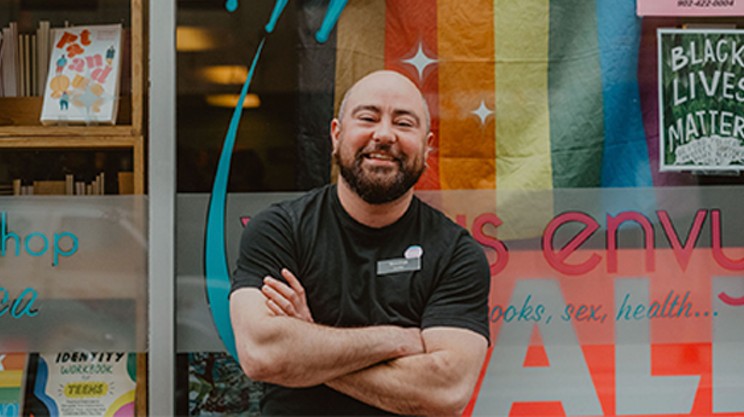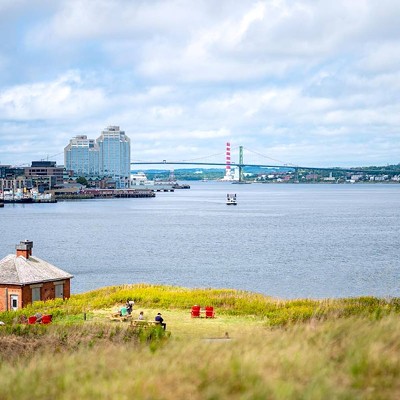
But some parts of the student experience are bound to look a bit different this year: living in residence, going to bars and restaurants and of course, hooking up.
“The way that we talk about hookups and safer sex and stuff is so affected by COVID,” says Christine Ollier, education coordinator and assistant manager at Venus Envy.
Venus Envy is a sex shop, bookstore and education centre in downtown Halifax, and typically provides the orientation-week sex talks to schools like Dalhousie and Saint Mary’s Universities.
“[It’s] by far the weirdest year that I’ve been doing the talks, and I’ve been doing them for a while now,” says Ollier, who’s been with the company since 2013.
This year, Ollier is pre-recording some of the talks by herself on Zoom, some are being recorded by professionals and some audio-only podcast-style talks that students can listen to on their own time.
“Some schools are also sort of bolstering that with like a live Q&A on Instagram or some sort of like format for students to have some sort of question and answer feedback instead of no interaction at all,” she tells The Coast.
The information contained in the talks will cover things like using protection, access to on-campus resources, and informed consent, like in other years. But this year has the added challenge of worrying about contracting COVID-19 during “fun sex times,” as Ollier puts it.
“We want to let folks know you are your own safest sex partner. The safest sex to be having right now is with yourself,” she says. “But then after that, next safest is with someone who you’re already living and sharing space and sharing breathing space with.”
You read that right, Ollier says masturbating the safest way to stay COVID-free. “It’s the first time I have been enthusiastically yelling at students to masturbate for years. It’s I think my favourite sex act that I’m the most passionate about is like have sex with yourself,” she adds.
And public health institutions are behind her on this. This spring, the British Columbia Centre for Disease Control released recommendations for safer sex during COVID, including self-pleasure and indulging in virtual or online sex.
“If you ask me 100 percent I think it's a great time to masturbate, now more than ever in these uncertain times,” says Ollier.
Although the Nova Scotia government hasn’t released any similar regulations, Ollier says following a combination of both regular COVID-19 prevention guidelines, and regular safer sex guidelines is a good start.
“This is the good news, if you’re having precautions, if you’re thinking about COVID and making sort of safer sex decisions with COVID, the good news is you’re probably already doing all of the safer sex things for STDs as well, barrier methods,” she says.
But as much as public health offices and sex education centres beg you to masturbate this year, Ollier knows not everyone will listen.
“While we know that in the sort of like hierarchy of risk and behaviours, having new sex partners is definitely like on the higher end of more risk, I also know that probably a lot of hookups are still going to be happening,” she says.
For students returning to Halifax (or anyone who’s travelled recently), isolating is the most important thing, even if two weeks may seem like a long dry spell to some.
A t South House, a Halifax sexual health resource centre, new outreach coordinator Francesca Ekwuyasi says talking about COVID is similar to the way we talk about STIs and contraceptives.
“If they’re hooking up with people, checking in about that the same way they would check about STIs, checking in about what their COVID status is and if they self-isolated,” she says.
But unlike STIs, the risk of COVID could spread to your roommates, family and even classmates or colleagues.
“The risk is broader,” says Ekwuyasi. “Like, the risk of an STI is typically between like two people, or like sex partners, but the risk of COVID is just more far-reaching.”
Other health authorities like the Mayo Clinic have also recommended limiting kissing during sex, but Ekwuyasi says the whole act in practice isn’t exactly clean.
“The reality is what sex looks like in practice can be messy. Like, we sweat and drip and touch our mouth and touch each other’s mouth. It’s hard, it’s really hard to say like this position you’re less likely to get COVID,” she says.
It’s been proven that COVID can be transferred through saliva (obviously) as well as both semen and fecal matter, but Ekwuyasi says it’s still unknown if other bodily fluids (like vaginal fluid, urine or blood) can spread the disease.
“All of this data is so new and we’re just very much at the beginning of understanding COVID,” she says.
Recommendations have even gone as far as wearing PPE like masks during sex and using glory holes (a hole in a wall used to facilitate often-anonymous sexual acts) to limit contact.
“Glory holes don’t exist, not that I’m aware of anyways, in Halifax. And like the average student coming back to school probably isn’t seeking out that, but it is like a legitimate way to engage in sex and limit contact,” says Ekwuyasi.
But while those may not be for everyone, sex educators are recommending using COVID-19 time to explore new ways of connecting to yourself and your sexuality.
“Just kind of broadening our understanding of what sex is and how it can look, while maintaining social distance,” says Ekwuyasi.
For Ollier, she hopes that people may even come out on the other side of sef-isolating having learned a few extra things about themselves, their bodies and their pleasure.
“It’s a really great opportunity— if folks want to look at it that way—of sexting with a partner to figure out what your fantasies are, what your boundaries are explore some things without trying them in person. It’s a really cool way of mapping out what your pleasure landscape might look like, and you can build intimacy, you can practice communication,” she says. “My dream is that everyone comes out of this with well-developed sex communication skills. That would be incredible.”
And who knows, maybe someone will get really into mask-wearing during their hot sexy times.
“Maybe folks will explore new kinks,” Ollier says. And we can't wait to hear about them in next year's Sex & Dating Survey.

















